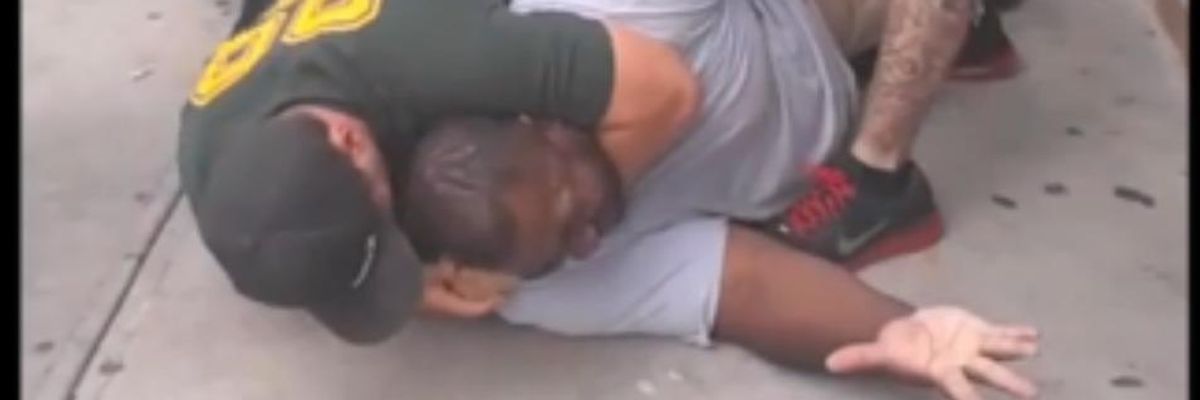New York Police Department Commissioner Bill Bratton announced Wednesday that every member of the department will undergo mandatory retraining on the use of force after the death of Eric Garner, a Long Island man who died in police custody after being put into a chokehold--a move that has been banned since 1993.
Garner's death prompted public outrage when a viral video showed officers using a chokehold to arrest Garner for allegedly selling untaxed cigarettes, an example of the kind of petty crime targeted by the NYPD's highly criticized "broken windows" approach to policing.
Garner, a 43-year-old father of six, was asthmatic; in a video recording of the confrontation, he gasps, "I can't breathe, I can't breathe" at least eight times as he is dragged to the ground and restrained.
The Staten Island District Attorney's Office has launched a criminal investigation into Garner's death. Two NYPD officers were suspended after the incident, including Daniel Pantaleo, who initiated the assault, as well as four EMTs who failed to give Garner proper medical assistance.
Pantaleo has a history of allegedly abusing his power; he has been sued twice for civil rights violations in the past two years.
Garner's death exemplifies a consequence of the broken windows policy. The tactic operates under the idea that targeting petty and minor infractions, such as loitering, trespassing, or in this case, allegedly peddling loose cigarettes on the street, helps reduce and prevent more serious crimes like assault and murder. Bratton has cited it as the cause of a drastic reduction in crime during the 90s, when he previously served as police commissioner. In a disturbing parallel to Garner's case, Bratton's first tour also saw the death of Anthony Baez, an asthmatic black man, who was killed when an NYPD officer put him in a chokehold.
"Why does the NYPD see fit to throw someone in a chokehold over 50 cent cigarettes?"
--Jose Trujillo, New Yorkers Against BrattonCritics of the policy have said it has not significantly helped in reducing the crime rate in New York and other big cities, and that it perpetuates widespread racial discrimination and increases risk of police brutality in otherwise nonviolent encounters. As Columbia law professor Patricia J. Williams wrote for The Nation, "New Yorkers have lived in the shadow of broken windows policing for two decades, during which time the policy has intimidated, dispossessed and humiliated millions of innocent people," also noting that it led to the implementation of New York's infamous and unconstitutional stop-and-frisk policy. A 2006 study by the University of Chicago found that there was "no support... for the proposition that broken windows policing is the optimal use of scarce law enforcement resources."
During a rally on Monday, Brooklyn College sociology professor Alex Vitale called it an example of over-policing and racial profiling. "There is very little support for the idea that broken windows policing in and of itself is responsible for the crime drop," Vitale said. "[It] over-polices communities of color and criminalizes young black and Latino men in particular."
Jose Trujillo, a leader of the activist group New Yorkers Against Bratton, spoke at the rally as well, asking, "Why does the NYPD see fit to throw someone in a chokehold over 50 cent cigarettes?"
"It's not just that harassment or inconvenience of being stopped," Trujillo said. "There are real physical threats to our bodies every single day, and until you live in our communities, you won't know that reality."
Donna Lieberman, executive director of the New York Civil Liberties Union, toldReuters that Garner was "a casualty of the 'broken windows' policing practices that are repeatedly reaffirmed as a cornerstone of policing policy in this administration. That's troubling."
The video, which was recorded by a bystander and friend of Garner's, Ramsey Orta, shows Garner telling the police officers that surrounded him, "Every time you see me you want to mess with me. I'm tired of it. It stops today." The officers move in on him shortly after. At a news conference on Tuesday, city councilwoman Inez Barron said that the tactic "often leads to confrontations" like the one between Garner and the NYPD.
A sign at Garner's memorial read, "The NYPD never choked a banker." Reverend Al Sharpton said during a public address at the Harlem's National Action Network, "There are many crises that we are dealing with, but none have impacted more and more than the recurring problem with the New York City police."
Garner's community in Long Island echoed the sentiment. A sign at his memorial read, "The NYPD never choked a banker."
This is not the first time this year that the police department has made headlines for its excessive force on unarmed citizens during nonviolent misdemeanor citations. In January, officers threw an 84-year-old man to the ground in a jaywalking stop, giving him a bloody head injury and a $5 million lawsuit against the city. Bratton said he was "not aware of excessive force" in that incident. Meanwhile, the Civilian Complaint Review Board is investigating more than 1,000 chokehold complaints against police officers in the past five years.
Officials say Garner died of cardiac arrest, although autopsy results are still pending. Bratton said the incident showed that the NYPD needs to do "a lot more, a lot more, on the issue of training." However, he continued to defend the Broken Window policy, stating, "There's no change in that focus at all. That's a key part of what we're doing."
Garner's funeral will be held Wednesday night in Brooklyn.

